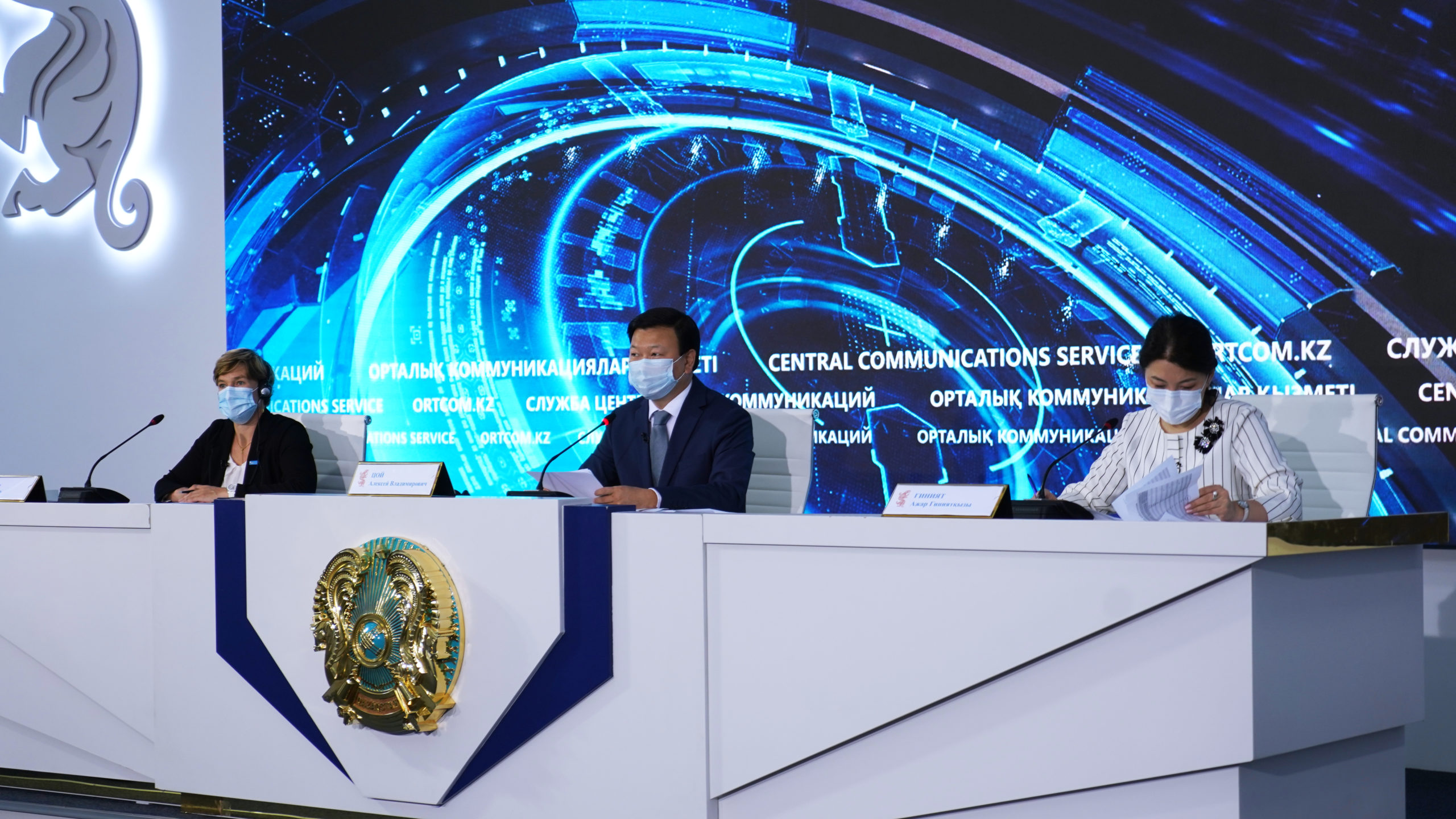NUR-SULTAN – Kazakhstan has passed the peak of COVID-19 infection, said Kazakh Healthcare Minister Alexey Tsoy at an Aug. 3 press briefing.

From L to R: Head of WHO Country Office in Kazakhstan Caroline Clarinval, Kazakh Healthcare Minister Alexey Tsoy and Deputy Healthcare Minister Azhar Giniyat. Photo credit: Central Communication Services
“We can say for a fact that the coronavirus situation in Kazakhstan has stabilized. You can probably see it yourself. The peak has passed and our goal is to safeguard what we have done and what was a very hard test for our people and our healthcare system,” said Tsoy.
As of Aug. 3, Kazakhstan has 93,820 confirmed COVID-19 cases and 1,058 deaths. The number of cases decreased by 18 percent compared to the last week, said the minister.
The country is currently in the midst of the second nationwide coronavirus quarantine it has imposed since July 5.
“Within the last three weeks, there is a significant, nearly two-fold decrease in daily coronavirus cases. The government has also managed to decrease the occupancy of infectious and provisional hospital beds. Just in June, there was still a critical situation in the hospitals,” said Tsoy.
He noted that the situation is still far from ideal, but positive signs are still there.
The basic reproductive number, or R0, which refers to the average number of people infected from a single case, has declined by 24 percent – down from 1.2 to 0.89. Before the nation’s stringent lockdown measures, the number was at 1.2.
“Two weeks since quarantine, we have witnessed a sustainable decrease in this number. The delayed positive dynamic is underpinned by the 14-day incubation period,” said Tsoy.
In its July 30 decree, the ministry made wearing masks mandatory, except for children under five years old, doing sports and for medical reasons.
The ministry initially obliged all citizens, including kids and newborns, to wear masks, but after public criticism, the ministry was forced to revise the rules. Those violating the new rules may face a fine of up to 83,500 tenge (US$198).
“As we said earlier, if a person wears a mask, the likelihood of him or her contracting is 30 percent lower, which eventually may decrease the number of coronavirus cases in one month from 300 to 85. Coupled with social distancing, the multiplicative effect may help push the morbidity rate down to 1 person a month,” said Tsoy.
Wearing masks should become a habit for citizens, he said, noting that it is a “critical temporary necessity.”
From Aug. 1, Kazakhstan also started to include pneumonia cases with coronavirus symptoms, but with a negative COVID-19 test, in its coronavirus statistics, though the coronavirus2020.kz national website still shows the statistics separately.
“According to the coronavirus coding algorithm, we now use U07.1 for confirmed cases and U07.2 for unconfirmed or potential cases. This means that patients with both the first and second codes will be identified as COVID-19 patients. While the first code is clear, in terms of the second code U07.2, coronavirus infection should be diagnosed based on epidemiological symptoms. That is, when the patient has been in contact with an infected person and based on clinical symptoms, such as fever, dry cough, intoxication, difficulty breathing or shortness of breath. And it should also be based on the results of instrumental research methods,” said Tsoy.
He noted that it will take time to train medical workers to diagnose coronavirus pneumonia.
Speaking at a press briefing, the head of the World Health Organization (WHO) Country Office in Kazakhstan Caroline Clarinval commended the nation’s new approach.
“Though this reclassification will show a surge in coronavirus infection, it will allow for a better understanding of the epidemiological process, better distribution of resources and more accurate national and regional response plans,” she said.
She applauded the immense efforts of medical workers.
“We highly appreciate their work and we can see that people are more aware of preventive measures. We also appreciate the involvement of Kazakh citizens who support health workers and vulnerable groups of the population. More than ever before, we must work together to overcome this outbreak,” said Clarinval.
Whether Kazakhstan will ease the lockdown restrictions on Aug. 17 depends on how the situation unfolds. Tsoy said that the ministry monitors key indicators and that these will be weighed in the final decision about whether to reopen or not.
